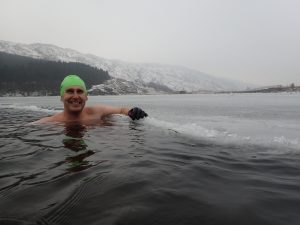Hypothermia
This is about mild hypothermia, just because the word mild is used, don’t think it’s not a big deal, it is serious and a mildly hyporthermic person will deteriate to moderate then severe without treatment.
The Basics of hypothermia:
Let’s look at hypothermia on land, this way you’ll understand it easier and then for additional information we can also relate it to outdoor swimming.
If you were out for a walk in the hills with a group of friends, having fun and talking away getting hypothermic would be easier to spot. That person would start displaying signs such as being unusually quiet, when they did talk, it would be more of mumble. They might be a bit grumpy when they are usually very enthusiastic, their foot placing might be poor, so they might stumble, they might struggle getting into their backpack which is usually a simple task for them. They will probably do the obvious one as well which is shivering and would also look pale. All these are relatively easy to spot on the hill. When swimming, it’s more difficult to spot, you might notice your swimming buddys progress has slowed , you might notice your buddy splashing excessively due to a detreating quality of arm stroke, but it will be subtle. When you get out, that’s when it gets obvious if you’re hypothermic, talking will be a problem, dexterity will be very poor (struggle to open an energy gel), walking will not be great, let alone running. You might have a lack of reasoning, thinking/saying you can keep going.
If you were swimming and it happens to you, how might it feel? You’d feel colder than you’d expect in those circumstances. You might not feel a big lack of power, but you might notice your progress is slowing and you don’t kick at your usual tempo. Your arm stroke is not as precise as it should be, your body roll is not as trimmed as you’d like. Your breathing is shallower which makes your timing for air more difficult so you get out of breath. Your thinking is such that you don’t feel that you are on top of your game, you mumble to yourself.
Food and Hypothermia:
We use the energy we get from food to do some important things, these include; keeping us warm, powering our muscles and feeding our brain. The food we eat contains lots of things, but it’s the carbs (carbohydrates) which are our fuel. These are split into two categories, simple and complex. Simple carbs are sugars and are easy for our muscles to access and store and these carbs are the ONLY type of fuel our brain uses. The complex ones are more difficult for our muscles to access, so they will always use the simple sugar first before the complex carbs, but the complex ones keep you going longer.
So why do we get hypothermic?
We can deal with poor weather conditions such as rain, wind or cold individually, but as soon as we are exposed to two or more we start to struggle. In water, basically, we’re in for too long and our energy is getting too low. We can deal well with cold quite well, but as soon as our energy gets low we just don’t have enough to keep us performing at the desired level, something has to give. In fact problems occur at a very similar time. We start to lack the zing we had, we struggle to concentrate and we start to feel cold. Basically the fuel tank is on empty.
Cure:
Get dry fast (if you’ve been swimming, you might need help to get your wetsuit off and dry clothes on), get into the warmth (don’t jump into a hot bath), hug your swimming buddy for some gentle warmth, eat high energy food and drink warm drinks. If you are not feeling better after a short time, get help, call 999 or get to A&E. Increasing your level of activity level does not warm up a hypothermic person like it does someone who is not hypothermic.
Prevention:
Prepare properly. Dress for the conditions and take spare clothing. Eat well before you go out on a cold day or an hour or so before swimming and hydrate properly. Take high energy food with you. Recognise the signs yourself. Look out for your friends, make sure your friends keep an eye on you. If you’re swimming, don’t stay in too long. Remember, the body cools 25 times faster in water than it does in air.

